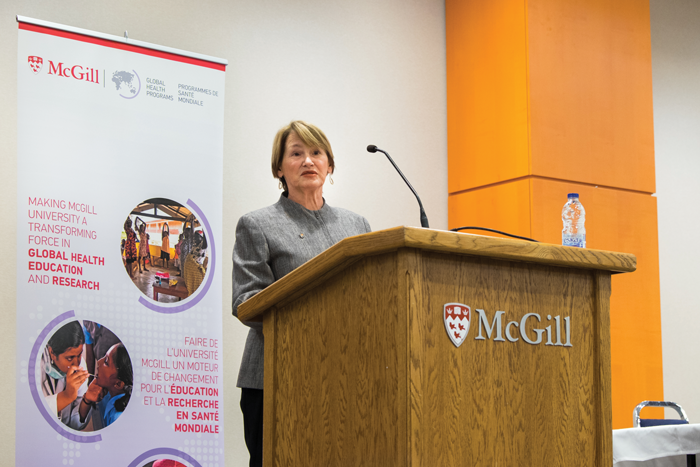“Global health at McGill is on a growth spurt,” Suzanne Fortier, McGill’s principal and vice-chancellor, said in her opening remarks at Tuesday’s Global Health Night.
The annual event honours McGill’s involvement in global health arenas by celebrating students and faculty members who have made award-worthy contributions to the field in the past year. The evening began with a poster fair in which students were given the opportunity to present their research, which ranged from projects on improved cook stoves in Tibet to evaluating health care in Rwanda.
Dr. Joanne Liu, international president of Médecins Sans Frontières (MSF) and a McGill alumna, presented the keynote lecture. As someone who has worked tirelessly at the front lines of many epidemic-ridden conflict zones, Dr. Liu provided meaningful insight to all aspiring global health workers as to what it really means to work in the field.
“It is important to stand for our principles, for what we believe,” Dr. Liu said. “It is important that at one point you draw a line. And you will have to draw your own line as you go around in this kind of world and […] see things that don’t make sense.”
Dr. Liu spoke about her time in the Democratic Republic of Congo in the middle of its 1999 civil war. She explained that the ‘humanitarian corridor’ she was working in quickly became known as the ‘humanitarian corridor of abuses.’
“That meant that every woman [in the corridor] got sexually abused,” Dr. Liu said. “I remember back then, that something had to happen [.…When] I presented [my solution to the MSF] board, their answer was, ‘This is war, Joanne; we’re [responsible for] life-saving and people don’t die from rape.’ But I did not accept that [.…] I would not accept the unacceptable.”
Despite resistance, Dr. Liu was able to develop a comprehensive package for responding to sexual violence cases—including a full medical examination, emergency contraception, wound care, and STI vaccines or preventative measures—that today is used almost universally.
The 2014 Ebola epidemic was an unprecedented and hopeless challenge for MSF, Dr. Liu explained.
“It is important to remember how unprepared we were, even though we are in the 21st century,” she said. “We can send […] people into orbit, but we [could] not care for people with a disease that was diagnosed in 1976.”
Dr. Liu concluded her address with a simple request to McGill’s future global health practitioners.
“Fight for life,” Dr. Liu said. “That’s the only rule I ask you to not break when you are going to do something in global health.”
For students interested in the future of global health at McGill, Dr. Madhukar Pai, director of McGill Global Health Programs, outlined the three goals of his strategic plan.
“First is [for] education and students,” Dr. Pai said. “The second is to support innovative global health research, and the third is [to] our international and national partnerships to further McGill’s presence, and actually become partners with other people [in the field of Global Health].”
The future for global health at McGill, according to Dr. Pai, is bright.
“[There] is a whole slew of opportunities for students to get involved in global health,” Dr. Pai said. “We have a journal called ‘Prognosis’, [about] global health, [which is] edited by our students. We started a new blog, ‘Global Health Perspectives’ [….] Our students [have our support] for whatever conferences they want to organize or host. [We offered] the first ever credited Global Health course.”
McGill is also working towards creating a School of Population and Global Health, which the Senate approved in October.
“We genuinely see that the future of Global Health Programs is within this school,” Dr. Pai said.









